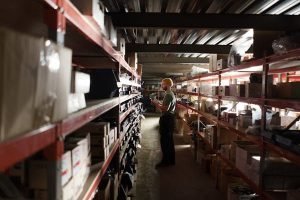Storekeeper Jobs in the USA with Visa Sponsorship
Storekeeper roles are a crucial part of the logistics and inventory management chain in industries ranging from retail and manufacturing to healthcare and hospitality.
With the expansion of warehousing and supply chain operations across the United States, demand for reliable storekeepers and inventory clerks continues to grow.
As labor shortages persist in some sectors, many U.S. employers are turning to international candidates, offering storekeeper jobs with visa sponsorship.
This presents a valuable opportunity for foreign workers seeking employment in the U.S., but the process involves several steps and considerations.
The Application Process
Securing a storekeeper job in the U.S. with visa sponsorship involves multiple stages, from job search and qualification verification to visa application and relocation.
1. Finding a Sponsoring Employer
The first step is to find a U.S. employer who is both willing and able to sponsor a work visa. These are often companies in sectors such as logistics, manufacturing, retail chains, or healthcare. Job search platforms like Indeed, Glassdoor, and LinkedIn, as well as international staffing agencies, list visa-sponsored job opportunities. Candidates should focus on job postings that explicitly mention “visa sponsorship available.”
2. Qualification Requirements
To be eligible for storekeeper roles, candidates generally need:
- A high school diploma or equivalent.
- Experience in inventory management or storekeeping.
- Basic computer and data entry skills, often using inventory software like SAP or Oracle.
- Good organizational and communication skills.
- Proficiency in English (spoken and written) is a key advantage.
3. Visa Options for Storekeepers
The most common visa pathways include:
- H-2B Visa (Temporary Non-Agricultural Workers):
Suitable for temporary or seasonal storekeeper jobs, especially in logistics and warehouse operations. Employers must demonstrate a lack of available U.S. workers for the position. - EB-3 Visa (Employment-Based Green Card):
This is a longer-term pathway for unskilled or semi-skilled workers. Storekeeper roles may qualify under this category, offering the opportunity for permanent residency.
4. Sponsorship and Visa Process
Once hired, the U.S. employer must:
- Apply for labor certification through the U.S. Department of Labor (DOL).
- File the appropriate visa petition with U.S. Citizenship and Immigration Services (USCIS)—Form I-129 for H-2B or Form I-140 for EB-3.
- Upon approval, the worker must apply for the visa at a U.S. embassy or consulate in their home country.
Benefits of Storekeeper Jobs with Visa Sponsorship
1. Legal Employment in the U.S.
Visa sponsorship allows workers to live and work legally in the United States with protection under labor laws.
2. Competitive Salary and Benefits
Storekeepers in the U.S. typically earn between $30,000 to $50,000 per year, depending on experience, location, and industry. Benefits often include health insurance, paid time off, and overtime opportunities.
3. Pathway to Permanent Residency
Through the EB-3 visa, storekeepers can eventually obtain a green card, leading to long-term residency and eligibility for U.S. citizenship.
4. Career Development
Storekeeping roles offer a strong foundation for advancement into positions like warehouse supervisor, inventory manager, or procurement officer.
5. Exposure to Global Business Practices
Working in the U.S. gives international workers valuable experience with advanced inventory systems, safety standards, and supply chain practices.
Challenges of the Process
1. Limited Visa Availability
The H-2B visa is capped at 66,000 per fiscal year, and competition is high. Some sectors may not prioritize storekeeping roles, making sponsorship harder to find.
2. Time-Consuming Process
From credential verification to visa approval, the process can take several months. Workers must be prepared for delays and document requirements.
3. Job Mobility Restrictions
Visa holders are typically tied to their sponsoring employer. Changing jobs may require restarting the visa process with a new sponsor.
4. Cultural and Work Environment Adjustment
Foreign workers must adapt to U.S. workplace expectations, cultural norms, and sometimes physically demanding conditions in warehouses or stockrooms.
5. Upfront Costs
Although some employers cover visa fees and travel expenses, many workers must pay for documentation, medical exams, and visa interviews on their own.
Conclusion
Storekeeper jobs in the USA with visa sponsorship offer international workers an accessible entry point into the American workforce, with opportunities for career growth and even permanent residency.
While the process requires patience and a willingness to adapt, the rewards legal employment, steady income, and long-term prospects make it a valuable pursuit.









